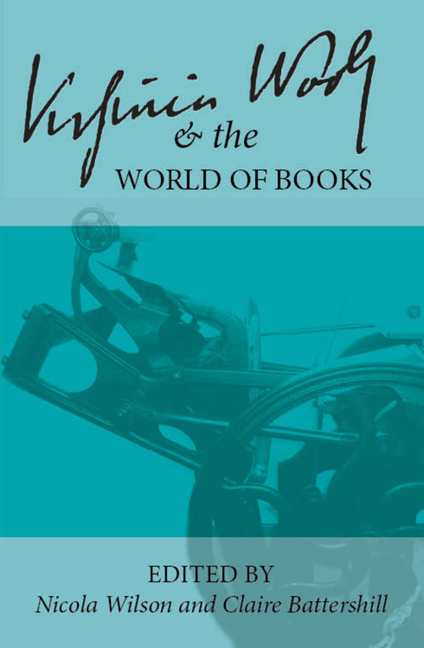 Virginia Woolf and the World of Books
Virginia Woolf and the World of Books Book contents
- Frontmatter
- Contents
- Introduction
- List of Abbreviations
- Keynote
- In the Archives
- Craftsmanship
- The Hogarth Press
- “obscure, indecent and brilliant”: Female sexuality, the Hogarth Press, and Hope Mirrlees
- After the Deluge, The Waves
- Alternative Histories: Hogarth Press's World-Makers and World-Shakers Series
- The Hogarth Press, a Singular Art Gallery
- Hours in A Library
- The Art of the Book
- The Art of the Narrative
- Making New Books: Creative Approaches
- The Book in the World: Woolf's Global Reception
- Editing and Teaching Woolf
- Intertextuality
- Lives in Writing
- Notes on Contributors
After the Deluge, The Waves
from The Hogarth Press
- Frontmatter
- Contents
- Introduction
- List of Abbreviations
- Keynote
- In the Archives
- Craftsmanship
- The Hogarth Press
- “obscure, indecent and brilliant”: Female sexuality, the Hogarth Press, and Hope Mirrlees
- After the Deluge, The Waves
- Alternative Histories: Hogarth Press's World-Makers and World-Shakers Series
- The Hogarth Press, a Singular Art Gallery
- Hours in A Library
- The Art of the Book
- The Art of the Narrative
- Making New Books: Creative Approaches
- The Book in the World: Woolf's Global Reception
- Editing and Teaching Woolf
- Intertextuality
- Lives in Writing
- Notes on Contributors
Summary
October 1931 saw two landmark Hogarth Press publications: Leonard Woolf 's After the Deluge: A Study of Communal Psychology and Virginia Woolf 's The Waves. Woolf 's novel sold out almost immediately, despite an initial run of over 7000, with a second impression of 5000 the same month, whereas the sales and reception of Leonard's Study of Communal Psychology seem to have disappointed. Virginia records in her diary how she has
been made miserable—damped & disheartened […] because the Lit Sup. only gave half a column of belittlement to After the Deluge. […] L. says—& honestly believes—that this puts an end to the book […] He says his ten years work are wasted, & that he sees no use in going on. (?23 October 1931, D4 51)
To make matters worse, the following day, the Guardian lauded The Waves in an extended review entitled “The Rhythm of Life”:
When I say this morning incautiously, “I'm reviewed in the M[ancheste]r Guardian” L. says “Is it a long review?” And I say, feeling like a mother to a hurt & miserable little boy, Yes. Lord what human beings are! (?23 October 1931, D4 51)
Yet, as Victoria Glendinning notes, After the Deluge received many positive notices, notably Harold Laski's in the New Statesman & Nation, L. B. Namier's in the Observer, and a review in the Melbourne Age which “praised the book as ‘an outstanding contribution to social psychology, […] as exciting to read as a novel’” (qtd in Glendinning 262). Indeed, Virginia refers to plaudits from “Laski & the experts” in her diary, for Harold Laski, a Professor of Political Science at the London School of Economics, had praised it as “a masterpiece” (D4 50). A fortnight earlier, Virginia noted how she was “trembling with pleasure […] because Harold Nicolson ha[d] rung up to say The Waves is a masterpiece” (D4 47), echoing Leonard's judgment when he read the novel in July. However, she was soon reflecting that the reviews “don't stir me very much” (ibid.), for “[w]e makers of masterpieces remain very calm, very well content” (D4 50).
- Type
- Chapter
- Information
- Virginia Woolf and the World of BooksSelected Papers from the Twenty-seventh Annual International Conference on Virginia Woolf, pp. 76 - 82Publisher: Liverpool University PressPrint publication year: 2018


